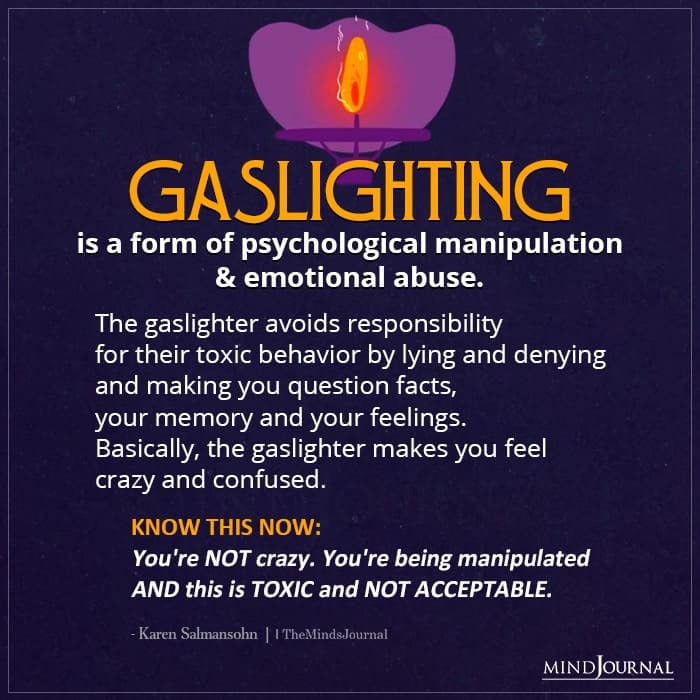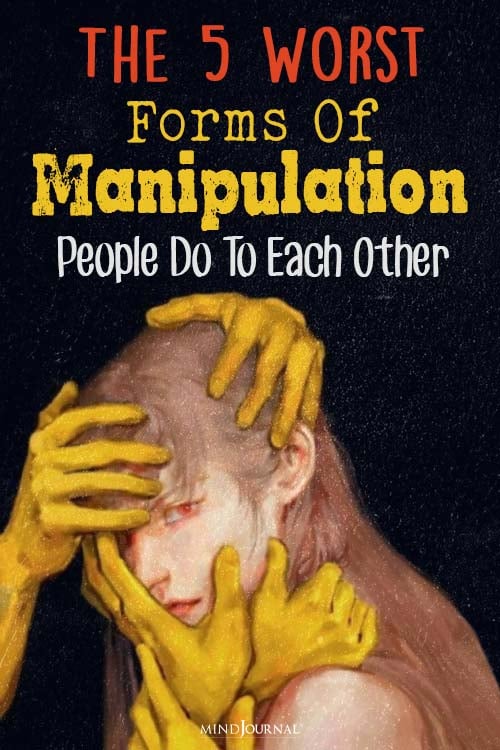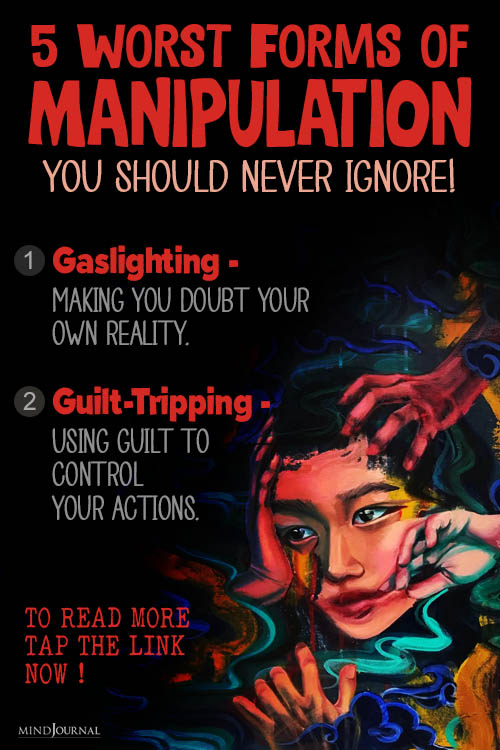Manipulation is sneaky, toxic, and all too common in how people treat each other. Let’s dive into the 5 worst forms of manipulation that can mess with your mind and emotions.
KEY POINTS
- The worst forms of manipulation are those that unravel our sense of self, leaving us doubting our worth.
- Whether it’s gaslighting, love bombing, or guilt-tripping, the goal is always the same: Control.
- Once we recognize these tactics, we can reclaim our power and ignore the mind games.
Humans are hands-down the most social creatures on the planet. We can form alliances, fall in love, and share Netflix passwords, but we’re also skilled at creating confusion and chaos inside the minds of others. Psychologically speaking, what’s the worst thing someone can do to another person?
Here are five.
Related: 4 Damaging Effects Of Emotional Abuse And How To Heal
5 Worst Forms Of Manipulation People Do To Each Other
1. Gaslighting
Imagine someone slowly, methodically convincing you that your memory is faulty, your feelings are invalid, and your version of reality is completely off.
That’s gaslighting, the psychological manipulation where one person systematically sows doubt in the mind of another, making them question their own perception, memory, and even sanity.
Originating from the 1944 film Gaslight, where a husband manipulates his wife into believing she’s losing her mind, this tactic has become disturbingly common in toxic relationships.
It’s an insidious form of mental torture because it attacks the foundation of a person’s reality.
In extreme cases, a gaslighter can convince their victim that they’ve fabricated entire events, leading to deep emotional confusion and self-doubt. The victim might think, Did I really say that? Am I overreacting? You’re not.
Gaslighting is emotional manipulation at its worst because it slowly erodes self-trust—leaving a person dependent on the manipulator for their version of “truth.”

2. Love Bombing
If gaslighting is the slow burn of manipulation, love bombing is the flashbang grenade. Love bombing is when someone showers you with excessive attention, affection, and praise in the early stages of a relationship to gain control.
It’s all heart-eye emojis and surprise visits with flowers at first, but the goal isn’t love—it’s control. Once you’re hooked on the dopamine rush, the love bomber starts pulling back, leaving you craving that affection like a phone addict searching for Wi-Fi.
This psychological tactic is commonly seen in abusive relationships or cult recruitment (yes, cults love bomb, too).
The manipulator sets up a cycle of intense highs and soul-crushing lows, creating an emotional rollercoaster that leaves the victim emotionally dependent and easy to control. A relationship that progresses too quickly is a red flag.
3. Guilt-Tripping
Guilt. It’s that awful feeling you get when you accidentally step on your dog’s paw or eat the last slice of pizza without asking. But in the hands of a manipulator, guilt becomes a weapon.
Emotional blackmail happens when someone uses guilt to force you into doing what they want, making you feel responsible for their happiness—or, more often, their misery.
Statements like “After all I’ve done for you…” or “If you loved me, you would…” are classic emotional blackmail lines. The goal? To trap you in a web of obligation, where your desire to avoid guilt makes you easier to control.
The manipulator subtly shifts blame onto you for their problems, ensuring you’re too tangled in guilt to see what’s really happening.
Related: 5 Sneaky Types Of Psychological Manipulation (And How To Fight Them)
4. Triangulation
Here’s a toxic relationship trick straight out of Mean Girls—triangulation. This occurs when someone brings a third party into a conflict or relationship dynamic to maintain control.
It’s like the manipulator is the director of their own soap opera, and everyone else is an unwitting cast member. Whether it’s pitting friends against each other or involving an ex in a current relationship, triangulation thrives on drama.
The genius (or evil) of triangulation is that it creates competition, jealousy, and confusion. Suddenly, instead of being upset with the manipulator, the victim is distracted by the third party, chasing after approval or validation.
Meanwhile, the manipulator sits back and watches the chaos unfold.
Triangulation is a favorite tactic of narcissists and high-conflict personalities because it destabilizes relationships and keeps everyone guessing.
Triangulation is a form of relational aggression meant to create a sense of unease and insecurity in the victim. And it feels like the perpetrator is creating drama from thin air.
5. Silent Treatment
Sometimes the worst thing someone can do is… absolutely nothing. The silent treatment may seem like a childish response to conflict, but it’s a devastating psychological weapon.
By refusing to communicate, the manipulator effectively “punishes” the victim, withholding attention and affection until the other person complies. It creates an emotional void where the victim is left to guess what went wrong, desperately seeking resolution.

The silent treatment works by exploiting our fundamental need for connection and social belonging. It sends the message that the victim is invisible, unworthy of attention, or not valued. Over time, this leads to feelings of rejection, loneliness, and low self-esteem.
Research shows that being ignored can activate the same brain regions associated with physical pain. In other words, the silent treatment hurts more than words ever could—because it’s the absence of any words at all.
Conclusion
The worst forms of manipulation are those that slowly unravel our sense of self, leaving us doubting our worth, our reality, or our relationships. Whether it’s gaslighting, love bombing, or emotional blackmail, the underlying goal is always the same: control.
Related: 10 Must-Watch Movies Featuring Devious Manipulators
But once we recognize these tactics for what they are, we can reclaim our power, assert our boundaries, and walk away from the mind games. In a world filled with manipulators, knowledge is your armor.
© Kevin Bennett, Ph.D., 2024
For more, check out Dr. Bennett’s TikTok @KevinBennettPhD and his podcast on danger, deception, and desire kevinbennettissnarling.buzzsprout.com
References:
Stern, R. (2018). The Gaslight Effect: How to Spot and Survive the Hidden Manipulation Others Use to Control Your Life. Harmony.
Archer, D. (2016). Red Flags: How to Spot Frenemies, Underminers, and Toxic People in Your Life. St. Martin’s Press.
Forward, S. (1997). Emotional Blackmail: When the People in Your Life Use Fear, Obligation, and Guilt to Manipulate You. HarperCollins.
Written By Kevin Bennett Ph.D.
Originally Appeared On Psychology Today











Leave a Reply